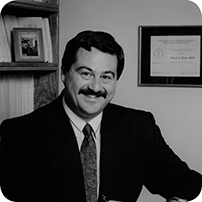Find a CBT Therapist
Search through our directory of local clinicians.
In Memoriam: Dennis C. Russo, Ph.D.

Dennis held many positions within ABCT and we got to know him well over the years. He started as a member of the Professional and Peer Review Committee. His vast knowledge of the field and his compassion was readily apparent. From there he served as Coordinator of Education Affairs (before we changed the position to Convention and Education Issues), Secretary-Treasurer, and then President. His commitment to AABT/ABCT didn’t end there. He also got to know many of our international members and served as our International Associates Chair.
His input is evident throughout the Association: in the development of our Fact Sheets, a more businesslike approach to how we handle our finances, and the development of the World Congress Committee, which eventually resulted in the World Confederation of Cognitive and Behavioral Therapies.
Dennis had a “wicked good” sense of humor, was a good partner to work with, and got things done. We will miss him as will his ABCT colleagues.
Other Past Presidents wrote that Dennis “was always so friendly at AABT/ABCT”; “was a giant in the field in more ways than one—he will be sorely missed—with sadness.”
His obituary noted that “Dennis was a pioneer in Pediatric Psychology and an accomplished researcher and clinician, Board Certified in Cognitive and Behavioral Psychology by the American Board of Professional Psychology.” He held appointments at University of California, Santa Barbara; Johns Hopkins University School of Medicine; Harvard Medical School; the May Institute; and East Carolina University/Brody School of Medicine.
Dennis was a devoted husband to Deborah and father to Nicholas and Amelia and when not coaching or cheering his kids on, was walking his dogs: Smokey, Bear, Buddy, Maxie, Ollie and Sasha.
Among his colleagues, Bob Leahy noted that he “was struck by his warmth. It sounds like he had a life worth living.”
Art Nezu noted that “Few people are as classy as they are brilliant. Dennis was both. He always had a smile to greet friends and colleagues, sound advice to give in response to queries, and administrative and clinical skills that benefited thousands. He…. left a wonderful legacy.”
Phil Kendall said “Dennis goes back to the time when behavior analysts, behavior modifiers, behavior therapists, social learning people, cognitive therapists, and CBT folks were still all one group of allies fighting for evidence-based care. He was a kind man whose heart and laugh matched his big frame.”
Kelly Brownell remembered Dennis as “skilled, wise, savvy, and very quick to smile and laugh—it was fun, affirming, and educational to be around him. Such a lovely person.”
Quite a few other Association Presidents shared their thoughts and remembrances: glowing, amused, appreciative.
At conventions, we would run into Dennis; we’d grab a booth or a couple chairs and start up a conversation, probably from the precise point we’d left a year or four earlier. We both looked forward to these chance encounters that brightened every evening.
(Obituary compiled from presidential remembrances emailed to Mary Jane Eimer and excerpts from https://everloved.com/life-of/dennis-russo/obituary/)
